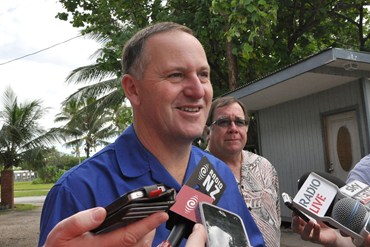 The New Zealand Government has taken refuge from the challenge of climate change by recasting it as a matter of political positioning. This is nowhere more clearly seen than in the frequently reiterated claim that we are doing our “fair share” in the international effort to reduce emissions. It’s a brash claim in any case, when our unconditional 5 percent reduction target on 1990 levels by 2020 is compared with the 30 percent unconditional target of Norway and Switzerland or the 20 percent target of the EU as a whole. But the Government prefers comparison with our “trading partners” Australia, America and Canada, and also largely excludes the emissions associated with farming on the grounds that the world needs the food we produce.
The New Zealand Government has taken refuge from the challenge of climate change by recasting it as a matter of political positioning. This is nowhere more clearly seen than in the frequently reiterated claim that we are doing our “fair share” in the international effort to reduce emissions. It’s a brash claim in any case, when our unconditional 5 percent reduction target on 1990 levels by 2020 is compared with the 30 percent unconditional target of Norway and Switzerland or the 20 percent target of the EU as a whole. But the Government prefers comparison with our “trading partners” Australia, America and Canada, and also largely excludes the emissions associated with farming on the grounds that the world needs the food we produce.
But brash or not what is convenient about the “fair share” argument is that it transfers attention from the alarming reality of climate change to the much more familiar and comfortable world of political negotiation. It enables Ministers to busy themselves with trying to get the best deal they can for the country vis-à-vis other countries, to protect the national interest, to preserve competitive advantage. Buried in such useful activity they can pretty well forget the massive and threatening question mark that climate change puts over the continued use of fossil fuels.
On the domestic front it fits well with adversarial politics, as was all too apparent in question time in the House a couple of weeks ago when Green MP Kennedy Graham questioned the Climate Change Minister about the 5 percent reduction target.

 Climate change minister Tim Groser has finally got around to announcing that
Climate change minister Tim Groser has finally got around to announcing that  I’ve been writing about climate science and policy for the last five years, and taking an interest in the subject for far longer, but I’ve seldom read more depressing news than Fiona Harvey’s Guardian article last week —
I’ve been writing about climate science and policy for the last five years, and taking an interest in the subject for far longer, but I’ve seldom read more depressing news than Fiona Harvey’s Guardian article last week —